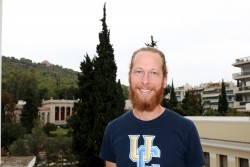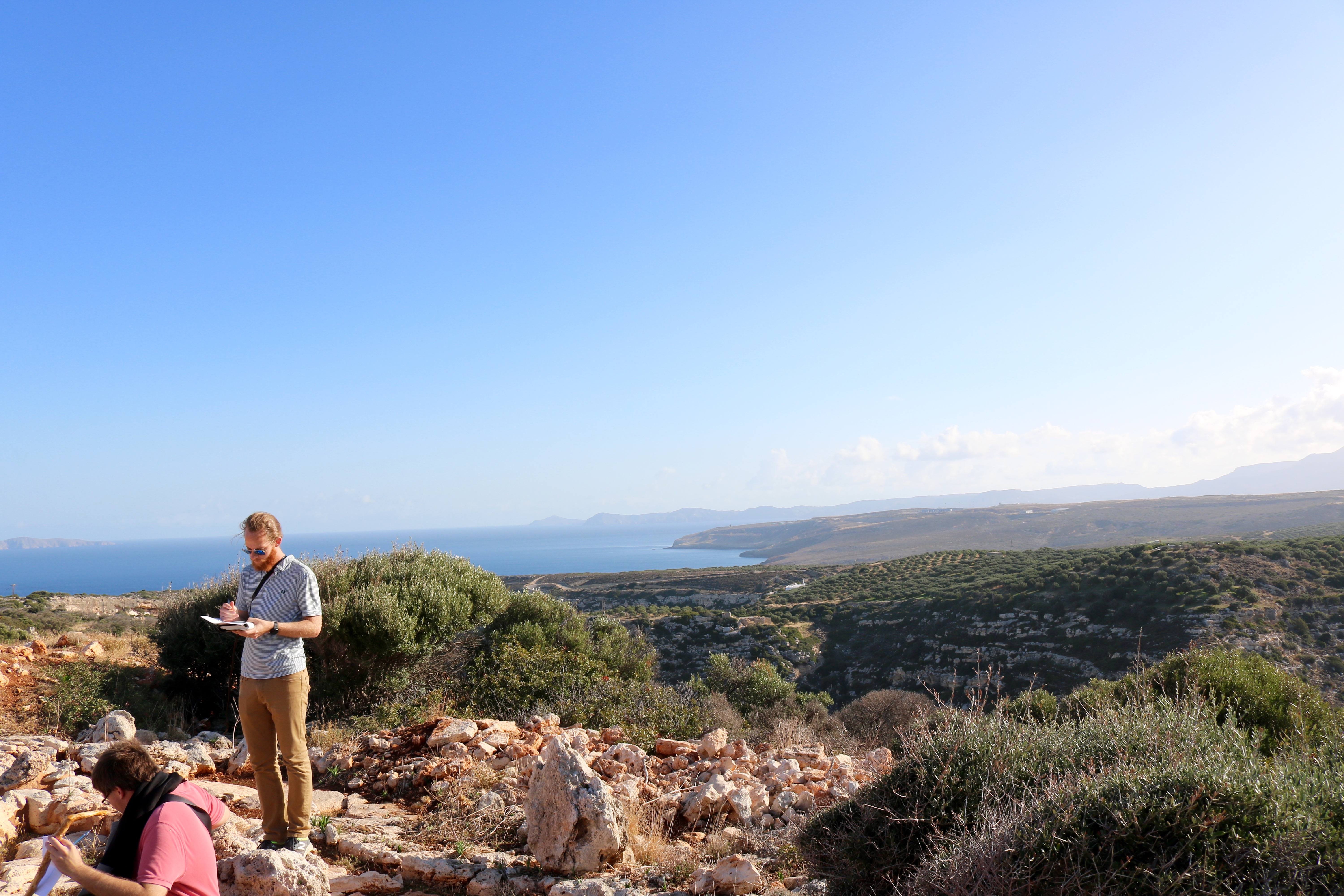Meet a Member: John Haberstroh

John Haberstroh is Ph.D. student studying Ancient Mediterranean History at the University of California, Riverside. He is currently is a Regular Member at the American School of Classical Studies at Athens.
Q: What is your academic area of interest?
A: I’m most interested in ancient Greek history and more specifically questions associated with ancient Greek identities. I look at the intersection between panhellenic and local Greek identities in the Archaic and Classical Periods.
I’m asking- how do different cities represent themselves? What does it mean to be a member of a certain polis or another? How do individuals reconcile their local identities with a broader sense of their Greekness? These can be questions of political identity or religious identity.
Q: What resources are you using to do your research?
A: The main sources are texts, and I have to be critical of what the texts say. For example if Herodotus says certain people were called “such and such” we generally take that as he says. But the questions get interesting when you include epigraphic evidence and inscriptions to see how people identity themselves. These sources give a more accurate impression of what happened “on the ground” in a given place. For me it’s interesting to compare local traditions with panhellenic traditions such as Homer’s Iliad. When those traditions clash I see panhellenic grand narratives problematized.
Q: What brings you to the American School?
A: My advisor Denver Graninger is deeply affiliated with the school and highly recommended it to me. He was a regular member during his graduate program too, so I see it as a rite of passage. It’s cool to walk in those shoes. And really this is a journey of discovery for me to figure out exactly what I’m getting into. These trips take you to far away places outside of Athens. I’m currently interested now in Boeotia and Epirus and how Greekness was displayed there.
Q: You’re a historian, so are you enjoying focusing on archaeology for a little while?
A: Yeah I think it’s important for historians and philologists to engage with archaeological material. It sometimes tells a different story from what our texts say, and we need to recognize that. As a historian I think I’m in a unique position to engage with archaeologists and philologists, so it’s good to see both perspectives through a historical lens. It’s good to receive this kind of training and exposure that I wouldn’t otherwise have.
Q: What was the most interesting site report that you gave?
A: I liked them all for different reasons. The most interesting one was my report on Dodona on trip one, it’s just such a bizarre place with the oracle of Zeus that was there. And Dodona is an excellent place to look at Panhellenic identity and what it means. Herodotus says that Dodona was one of the oldest and most famous oracles and that even non-Greeks would go there because it was so famous. But when you look at the actual ownership of the site it’s pretty much dominated by one regional group in Epirus. What are other groups doing to influence this narrative? Who owns the site? To me these questions challenge the idea that it’s a Panhellenic site. Certainly other Greeks knew about Dodona and went there, but these labels are what I’m interested in understanding a bit more.

Q: What is your favorite place you’ve visited in Greece?
I’m not gong to say Delphi because everyone says Delphi. There are just so many good sites and museums. If I have to pick just one I would say I was really moved at Distomo where there was a massacre during WWII. They have a monument with all the names and the ages of the people who were killed, and I think we can forget sometimes as classicists that there was life after antiquity. That was a really moving site to visit, the museum even more so, to see the photos of people and the stories.
Q: You’re writing a blog about your time here called A Run Through Time. What inspired you to keep the blog?
A: I’m writing a blog tracking my year, and also I’m a long distance runner so I’m also trying to document that interest. As a side interest I’m interested in ancient Greek athletics, because there were long distance runners then too, and I connect with that on a personal level. I try to get at that in the name A Run Through Time — thinking of history as a place you go to, and a place you access through texts. I’ve had some really cool running experiences, and I will hopefully make a post soon about that. It’s really fascinating to see there is a continuity in our love of running. Ancient Greek runners were famous in their time, and some were even celebrities, and there’s this connection with the Olympic Games and the original marathon run.
Q: What is your favorite restaurant in Athens?
A: We went to this Cretan restaurant called Katsourbos in anticipation of the Crete trip. This place was just 10/10, completely knocked it out of the park in regard to the atmosphere and the food. It was perfect. We had this goat risotto dish that was really delicious and rooster with noodles. It was so good.
Q: If you were a Greek god or goddess which one would you be?
A: Apollo, easy. Dionysus is good too. Apollo just really commands his position in the pantheon, he touches so many different issues which is interesting— plague, prophecy, and he plays music.
Q: Is there anywhere else you would like to visit in Greece?
A: I’ve only been to three of the islands, so I would love to see more. That’s only a small fraction of all the islands there are.
Q: What do you get from your experience at the ASCSA?
A: At the American School you are surrounded by people who all do the same research as you, and you’re able talk to other people and share research interests that you couldn’t otherwise. Similarly it’s incredible to have the constant access to the expertise of the faculty here. To really be led through these sites with a pro is just incomparable. And it’s such a privilege to even be here.